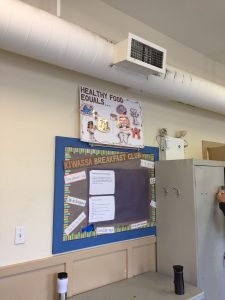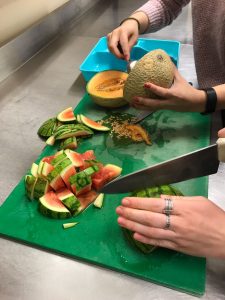A big thank you to everyone for following us on this adventure. We can’t believe that it is all coming to an end and that this Monday will be our grand finale where we will be presenting our CBEL project to our instructor, peers, TAs, community partner guests, and peers.
We have created an infographic, which can be seen here to show everyone a visualization of what we have accomplished, our aim, our approach, our findings, and our take-home message.
Moments of Significance
What?
The last few weeks have been very hectic , as we proceeded to quickly wrap up calling the farmers on our directory and met up with our community partner for the last time. We tried contacting a few of the farmers who we were unable to reach during our first round of phone-calls (due to them not answering). However, we were only successful in reaching a few farmers during the second round of phone calls. We think that the lack of response from farmers may be related to it being the off-season for farmers in B.C., thus their farms are closed for the winter.
Reflecting back to the beginning of term made us all realize how much work and time we have put into this project over the past few months. We started out never having worked with one another before, which in itself brings some uncertainty to a project as you don’t know if the group dynamic will work well or not. We also were not fully sure of what was expected of us, as this project has never been done before. Where do we start? How do we contact farmers? And how many should we contact? What is the end goal 3 months from now? But before figuring that out, we needed to first get to know one another. We all met one another for the first time outside of class at a small coffee shop next to our community partner’s office. we sat down and planned what we were about to say to him, and the specific questions each group member would ask.. We brainstormed for almost 2 hours and quickly learned that we were all very opinionated people, with different understandings of what was expected of us from this project, so it took us a little bit of time to settle down and focus. What gave us hope was having read Katherine Philip’s 2014 article in the Scientific American that stated that variant backgrounds forces people to work harder and diversity actually makes us smarter in developing new ideas and innovations (Philips, 2014).

Kiwassa Neighbourhood House
Overcoming the first bump of figuring out how to work with one another’s strengths helped us understand our project more. We also realized, after brainstorming together to prepare for our very first meeting with our community partner, was that it is important to listen. After listening to Sirolli’s TED Talk, “Want to help someone? Shut up and listen!” we realized it was important to just listen to what was being asked of us and what it was that our community partner needed help with (2017). But we were also relieved when Robin informed us that this was also our project and we could shape or form it in any way that we want. We felt at ease and confident leaving that first meeting, although, a little nervous. As the weeks went on, we started to look for farmers and although we were able to gather a directory of 113 farmers, we are more than certain that there are many more farmers out there. These 113 farmers were the ones that were found online, however, there are many more out there who may not list their farms online. We also visited the two Winter Farmer’s Markets that are currently open and were able to hand out a few Breakfast Club of Canada business cards and explained to them what our project was about – which was a bit nerve racking. . We slowly began calling farmers after visiting Robin a second time, where is demonstrated how to cold call a farmer. We left that meeting feeling slightly nervous as we knew that each cold calling 20 farmers wouldn’t be as easy Robin had made it look. But we were still very optimistic for what was lying ahead because visiting the local breakfast program as Kiwassa Neighbourhood House really showed us the reason why our project mattered.
So What?
We found that after our first visit to the farmer’s market we were not as successful as we had hoped it would be. So, we reflected on our approach and decided that maybe it would be better to go as a group and not just a single person. Our logic was that maybe having just a single group member reach out to farmers gave off the impression that we were not legitimate, and lacked confidence to persuade. But the following week, we found that by making this small change and having two of our group members visit another farmer’s market showed results. We all started to call farmers and were finding it difficult to cold call them because no one was picking up the calls. But we adjusted it by looking at our project as if we had failed, and working backwards (Freakonomics, 2015) we found that it was wise to adjust our calling times to ensure that we were calling at different times (i.e. weekdays versus weekends, or morning instead of afternoon). A few farmers that we had originally received no answers from, later picked up the phone at another date when we called back. We found that by working backwards from a failed project helped us realize where the potential to fail would occur. By seeing this, we could avoid it.
Now What?
In the end, out of the 113 farmers we contacted, 18 were an affirmative yes to joining our project in donating local produce to the Breakfast Club of Canada schools, and 20 said maybe depending on their harvest. About 49% of the 113 farmers did not answer but, going forward, we feel that if we had more time, we would have been able to reach out to the remaining 45 farmers. Perhaps, reaching them at a different time, visiting them in person, or emailing them prior to contacting them via phone would show more results.

Watermelon, cantaloupe & grapes-some examples of the fruits available to students at the Kiwassa Neighbourhood House
Final Thoughts
We hope that our project has helped the Breakfast Club of Canada with creating a lasting relationship between school breakfast programs and local farmers in B.C.. The directory that we created over the past few months, of B.C. farmers who are willing to donate to their breakfast programs, was the very first step taken towards forming this relationship. Looking forward, we are excited to see how future groups build upon what our groups has accomplished! We were so fortunate to be able to visit a local breakfast program and were amazed by the dedication of the volunteers at the program. We really hope that our project is able to help provide more predictable, nutritious and diverse breakfast foods to vulnerable students students and families participating in the breakfast programs in B.C.! With the help of the local farmers, the students and families who visit the breakfast programs will have access to local produce with high levels of nutrients.
Thank you to everyone for following us on this journey! Most of all, thank you to Carrie, our T.A. for her tremendous support and help along the way! As well as, our instructor, Will and our community partner, Robin for his quick and fast replies!
References
Freakonomics. (2015, May 20). Failure Is Your Friend: A Freakonomics Radio Rebroadcast [Audio file]. Retrieved from http://freakonomics.com/podcast/failure-is-your-friend-a-freakonomics-radio-rebroadcast/
Philips, K. W. (2014, October 1). How Diversity Makes Us Smarter. Retrieved from Scientific American: https://www.scientificamerican.com/article/how-diversity-makes-us-smarter/
Sirolli, E. (2017, January 24). Ernesto Sirolli: Want to help someone? Shut up and listen! Retrieved from TED Talks: https://www.youtube.com/watch?v=chXsLtHqfdM
Recent Comments